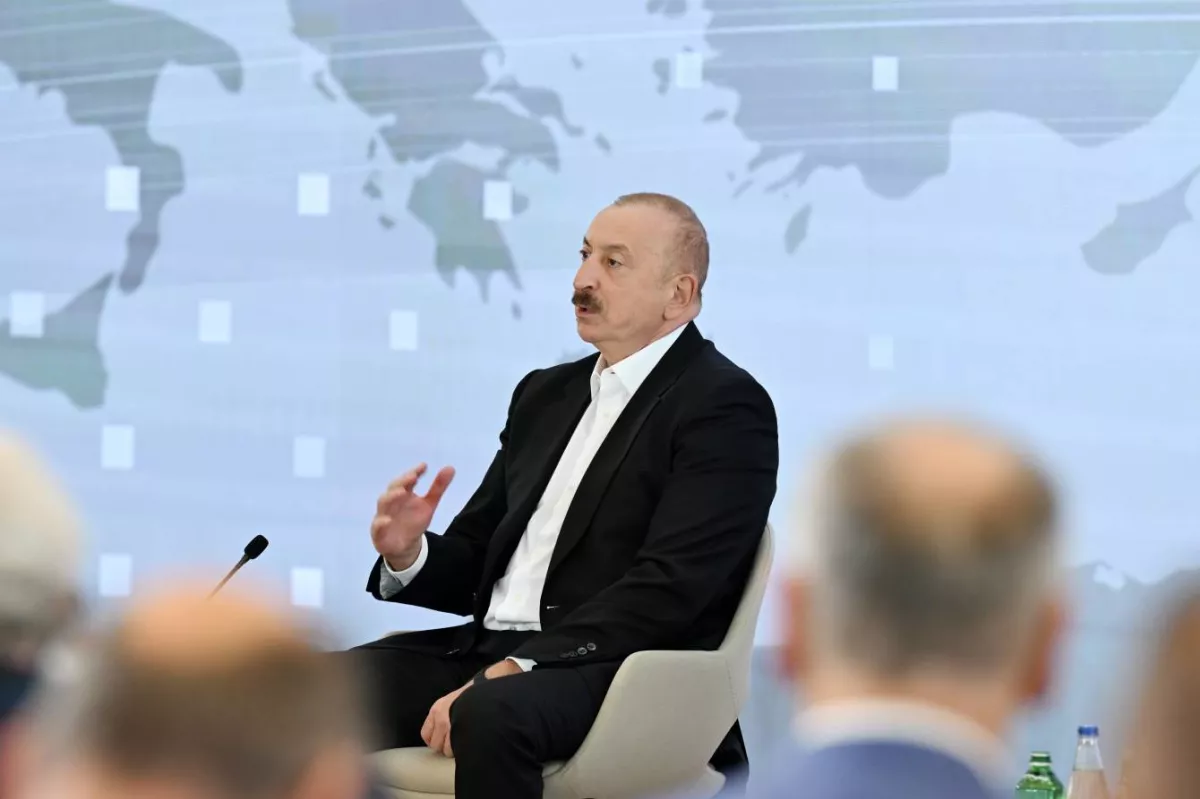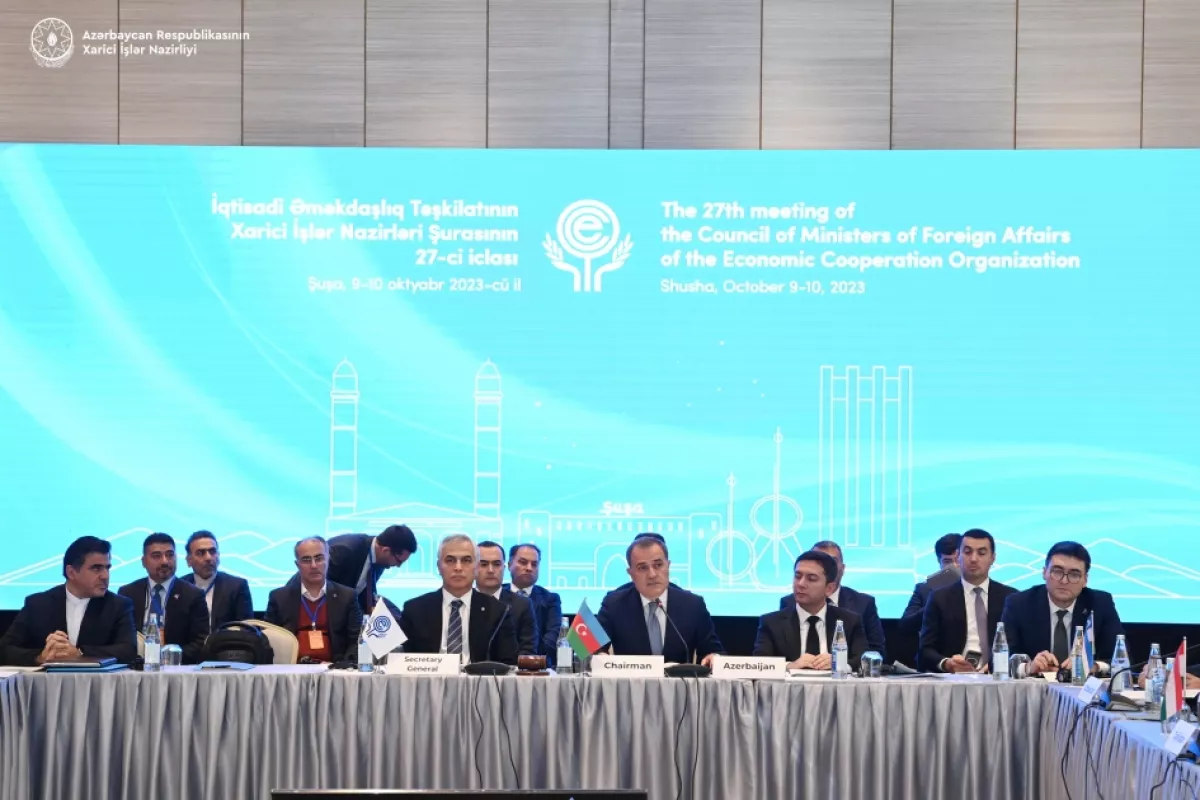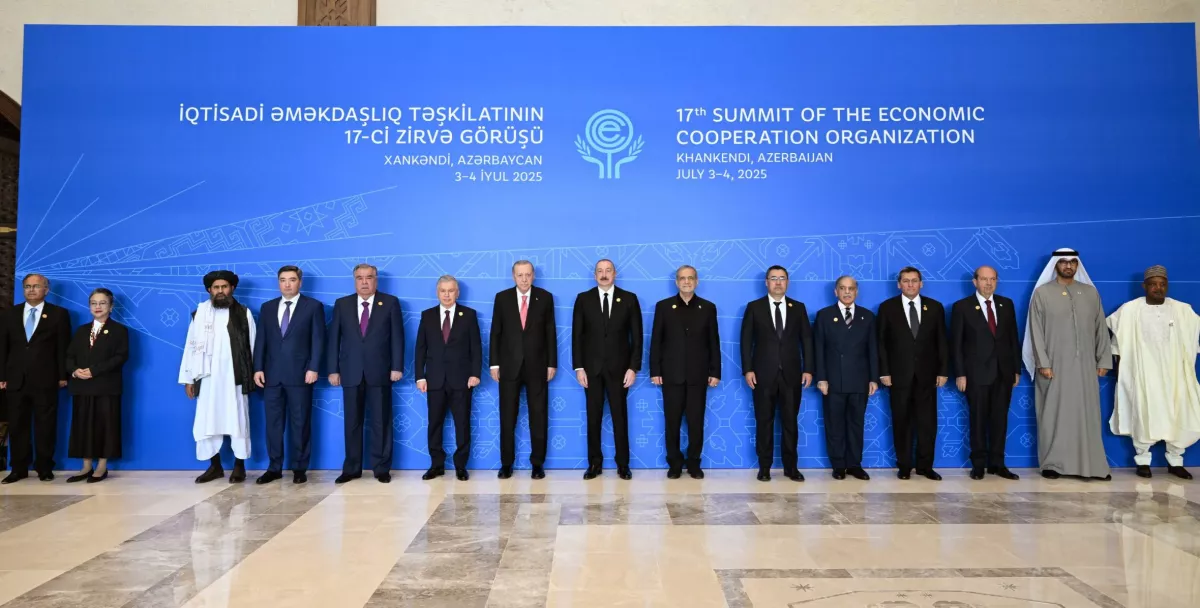Strength in creation: ECO charts visionary path at Khankendi Summit
The recent XVII summit of the Economic Cooperation Organisation (ECO), held in the revived heart of Karabakh—the city of Khankendi—became a truly landmark event for the region, which is gradually transforming into a sustainable platform for political and economic dialogue.
This was also emphasised by the President of Azerbaijan, Ilham Aliyev, at the III Shusha Global Media Forum on the topic “Digital Pathways: Strengthening Information and Media Resilience in the Age of AI.”

“With respect to ECO, I agree that this organization has great potential. At this summit in Khankendi, we wanted to bring a new dimension to the institution. Prior to the summit, I met with the Secretary General, Mr. Khan — who, as you know, is from Pakistan — and we agreed that this time we would have different fora. All of them were held here, in the liberated territories: one in Shusha, one in Aghdam, and one in Lachin. It was a Business Forum, a Women’s Forum, and a Youth Forum. Then, representatives of these fora reported at the summit, in front of heads of state, about what they had discussed and agreed upon. So, we need ECO to be more consolidated and more efficient, because we know the potential of its member countries,” said the head of state.
Azerbaijan has now hosted the ECO Summit for the third time—the previous two took place in Baku in 2006 and 2012. With each successive summit, the country has not only deepened its economic cooperation with ECO member states but also strengthened its image as a leading regional power on the international stage. It is therefore no surprise that Azerbaijan is today regarded as a reliable partner, capable of effectively contributing to integration processes in the trade and economic sphere with a forward-looking vision.
Shared goals and objectives
Originally founded in 1964 by Türkiye, Pakistan, and Iran as the “Regional Cooperation for Development” initiative, the organisation expanded its geographical scope in 1992 with the accession of Azerbaijan, Afghanistan, Kazakhstan, Kyrgyzstan, Tajikistan, Turkmenistan, and Uzbekistan. It was then renamed the Economic Cooperation Organisation (ECO).
In the years that followed, the Republic of Azerbaijan emerged as one of ECO’s active participants, successfully building mutually beneficial cooperative relations with member states. As a result, relations with ECO countries have come to occupy a special place in Azerbaijan’s foreign policy agenda. President Ilham Aliyev highlighted this during his remarks:
“Azerbaijan is an active member of ECO. Our relations with the ECO Member States are based on friendship and mutual respect. We also enjoy fruitful cooperation with the ECO Member States within international platforms, including the Organization of Islamic Cooperation and the Non-Aligned Movement.”
These words reflect Azerbaijan’s multi-vector foreign policy, which gains particular relevance against the backdrop of the country’s growing economic potential and advantageous geostrategic location. In this context, Azerbaijan’s substantial contributions to enhancing cooperation within ECO are worth noting. The construction of the Baku–Tbilisi–Ceyhan oil pipeline, the launch of the Baku–Tbilisi–Kars railway line, and the establishment of Azerbaijan as a key link in the Southern Gas Corridor—all stand as direct embodiments of ECO principles: the development of trade, transport, and energy cooperation among Eastern nations.

A crucial factor is that Azerbaijan, acting in line with the strategic objectives of the organisation, makes a significant contribution to ensuring stability and development in the South Caucasus region. Thanks to this role, several major international events have taken place on the territories liberated from Armenian occupation. These include the ECO Council of Ministers in Shusha in 2023, the first informal summit of the Organization of Turkic States in 2024, and the 2025 trilateral summit of the leaders of Azerbaijan, Türkiye, and Pakistan in Lachin. As President Ilham Aliyev emphasised: “Azerbaijan is not just a participant in integration processes—it is their catalyst.”
Forward-looking projects
Given that ECO member states are located within the same geographic space, a number of transport and logistics initiatives are of particular interest to Azerbaijan. Among them is the Trans-Afghan railway project, which will give Azerbaijan access to the Pakistani ports of Karachi and Gwadar via Turkmenistan, Uzbekistan, and Afghanistan. This project will also provide other ECO countries with access to these ports and enable cargo movement along this route in the direction of Azerbaijan.
Equally important is Türkiye’s “Development Road” initiative, which forms part of the Trans-Caspian International Transport Route (TITR). If implemented, this project will allow Azerbaijan to access various seas and ports through Türkiye—significantly expanding the country’s transit potential.
Karabakh: A platform for peace and economic cooperation
Returning to the choice of Khankendi as the venue for the ECO summit, it must be noted that this served as a powerful symbol of sovereignty and spiritual freedom gained by the Azerbaijani people following the full restoration of the country's territorial integrity and the integration of the entire Karabakh region into Azerbaijan’s unified administrative and legal framework.

At the same time, this sends a clear message to the international community: Karabakh is a platform for peace and sustainable economic cooperation—not a zone of conflict.
In this context, the large-scale reconstruction of the territories liberated from occupation plays a critical role. This process began immediately after Azerbaijan’s historic victory in the 44-day war.
In his address to the nation on 10 November 2020, President Ilham Aliyev stated: “The IDPs are well aware that we will do our best to help them return to their ancestral lands. We will rebuild these liberated lands.”
As is well known, President Ilham Aliyev’s words are always backed by action. Across Karabakh and Eastern Zangazur, cities and villages are being rebuilt, roads are being constructed, infrastructure is taking shape, and industrial facilities—many of which are already operational—are being established.
At the July ECO summit, President Ilham Aliyev highlighted that more than 50,000 people are already living, working, and studying in the liberated territories. The issue of securing the rights of Western Azerbaijanis who were deported from Armenia also received attention during the event.
“We highly appreciate a resolution affirming the right of return of Azerbaijanis forcibly displaced from Armenia, adopted by the unanimous decision of all 57 members at the Council of Foreign Ministers of the Organization of Islamic Cooperation in Istanbul, last month,” stated President Ilham Aliyev.
These words send a clear message to the international community: Baku will continue its efforts to ensure the peaceful return of Western Azerbaijanis to their ancestral lands in Armenia. The significance of this politically charged statement—delivered by the head of state in Khankendi—lies in the confidence that every ECO member supports Azerbaijan’s legitimate position. Within the organisation, there is full solidarity with Baku on all matters. This reflects not only the economic interest ECO countries have in Azerbaijan, but also the deep respect for the leader of the South Caucasus, whose views are taken seriously by influential global actors.
In summary, it can be stated with full confidence that thanks to Azerbaijan’s initiative, pragmatic efficiency, and commitment to constructive engagement, the true potential of the ECO member states will be fully realised. This, in turn, will undoubtedly contribute to sustainable progress across a vast region encompassing the South Caucasus, Central Asia, and South Asia.








